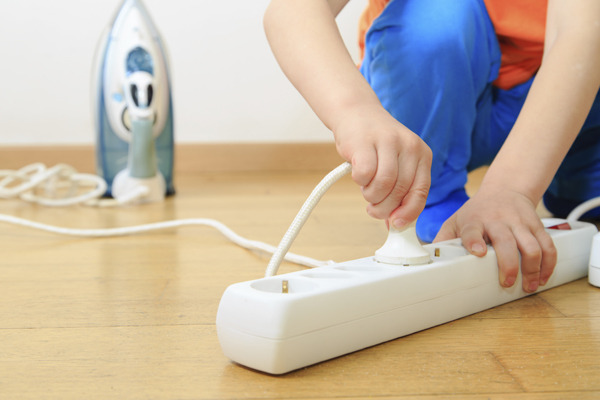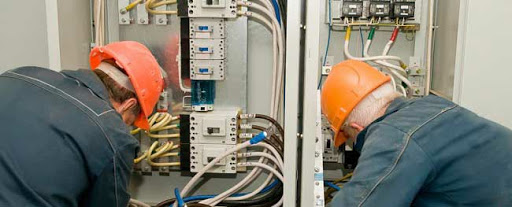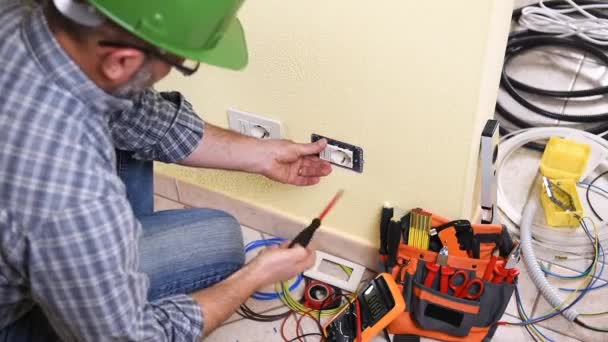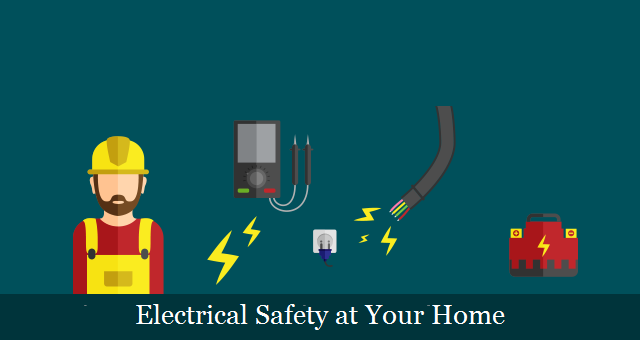Electricity is the most common energy that you use for your home. Though it is one of the most powerful tools, it can sometimes be dangerous to you and your family members. You need to understand the importance of electrical safety measures to save your family from hazards.
The Most Common Electrical Hazards Caused at Home

Home electric safety is not something you should ignore. Most of the home hazards are caused by faulty electricity which can injure or even kill a person, if not used in the right manner. Look around your house, do you take the safety measures that you are supposed to take. Some of the most common electrical hazards that occur at home are:
- Electrical fires
- Electrocution
- Electrical burns
- Shock
- Secondary and indirect injuries
Important tips to Maintain Electrical Safety at Your Home
You can prevent several electrical hazards at your home by following simple safety tips. Mentioned below are preventive measures and precautions to take while using electricity, electrical outlets, and appliances at home.

Use the Correct Wattage of Appliances and Fixtures
You must always use the right wattages of the electrical appliances and fixtures to prevent electrical troubles or hazards. You can use LED bulbs because they consume less electricity, thus saving your money.
Check Overloading of Power Supply
Overloading of electricity supply is a common problem that you can face at home. Check out all the outlets to make sure they are cool to protect your house. Also, you can use faceplates that protect power overloading.
Keep Away Your Electrical Outlets and Devices from Water
As you know, electricity and water do not mix well. So you should always keep all your electrical outlets, wires, and devices away from sources of water to prevent shocks and burns. Keep them away from:
- Aquarium
- Plant and flower pots
- Showers
- Bathtub lowers
- Sinks and faucets
Repair or Replace the Damaged or Defective Electrical Wires
Damaged or defective electrical cords and wires at your home can cause serious electrical in-house accidents like fires and electrocution. You can call BG Electricians Brisbane for professional help to repair or change your cables for preventing electricity tripping and overheating of electrical devices and fixtures.
Unplug Unused Appliances and Switch Off Extra Outlets
Unplugging your electrical appliances and switching off the extra power outlets will help you to reduce potential risks of electrical hazards at home.
Debunking Popular Myths about Home Electrical Safety
There are many things that you can do to keep your family and home safe from electrical hazards. Being safe means you need to have knowledge about the dangers and hazards of using electricity and differentiate between fact and fiction. Here are 7 common myths about electrical safety at home.

Gloves and Shoes Made of Rubber are Good Electric Insulators
Regular shoes and gloves are made of rubber mixed with other materials that do not provide full protection against electric shocks. They become better conductors instead of insulators. Insulating shoes and gloves made of 100% rubber are only electrically safe and can give protection against electrocution.
Wooden Ladders Prevent Electrical Hazards
Wood is a poor electricity conductor, but a wet wooden ladder or one that has metal brackets can transform into an excellent conductor. The power supply of high-voltage is no problem. But when working on low-voltage lines, one must be careful.
All the Power Supply Lines are Insulated Well
Most of the power lines present outside are not insulated and are bare wires. Though they have weather protection coating, the electricity supply lines do not provide any insulation or prevent shocks. No wire is completely safe to touch or reach closer to it.
Only High-Voltage Power Supply Lines are Dangerous
Electric current irrespective of voltage is dangerous. Any electric supply that goes to your house through outlets can be hazardous and can cause injuries. So you should never go near or touch an electric wire that is left open and unattended. Keep your children and pets at a safe distance from the wires as well.
All Extension Cords and Wires are Weatherproof
You should know that all the extension cords and wires are not suitable for external use. If you want to use an extension wire for outside to put holiday lights or lampshades, make sure to check the label and buy only those that are specifically for external use.
Sparks can be Seen if Live Wires and Cords Fall
Sparks from live power supply lines can be seen if the wire falls on the ground and does not make any firm contact with either the ground or with any material that is a conductor of electricity. But If the wire falls and does not make any contact, then you will not see any spark or hear any noise. It will just be like a dead wire or one that has been de-energized safely.
Electric Shock from a 3 Milliampere Current is Harmful
A human body can conduct electricity if he or she is directly connected to a part that is energized. The current will flow from the contact point to the ground which is the exit point. A shock from a current as low as 3 milliamps can cause injuries like bruises, collisions, spontaneous muscular reactions, fractures.
Conclusion
Home electricity safety is essential for your home. You should follow some tips to prevent electrical hazards and keep your family safe. But don’t blindly believe anything and try to get complete knowledge. The above-mentioned myths and their truths will help you to take safety measures.






